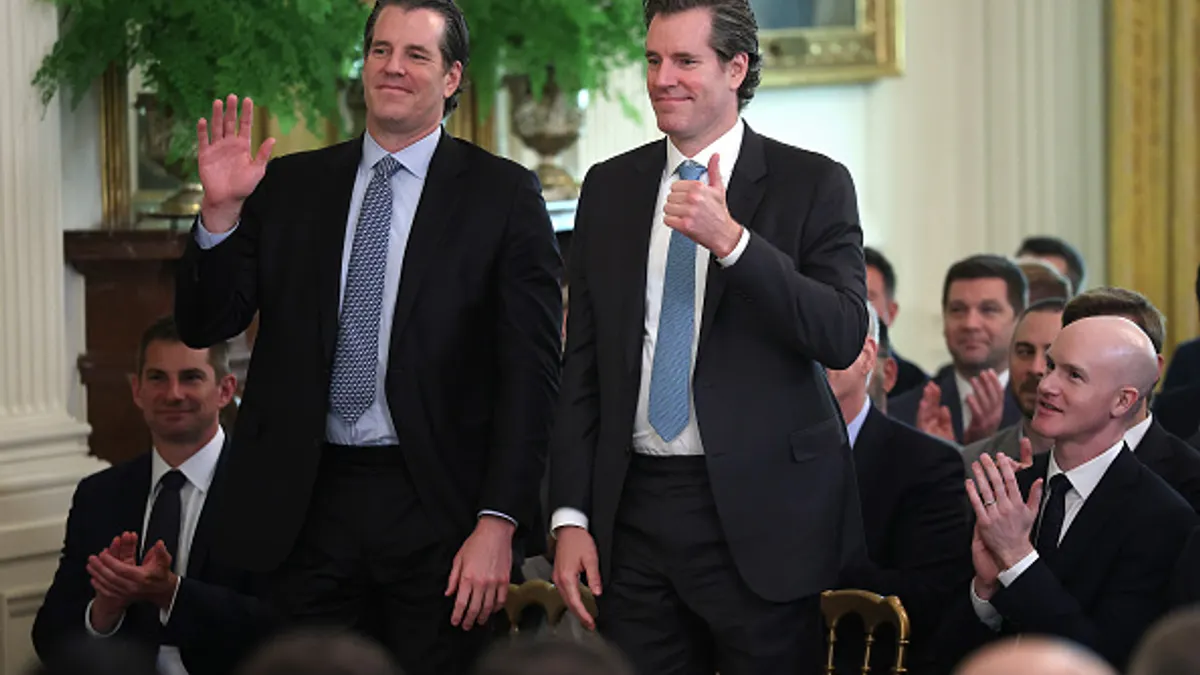This article includes insights shared during the Sept. 24 live event, CFO Live 2025: The Future of Finance, which was jointly moderated by the editorial teams of CFO Dive and its sister publication CFO.com. Full panel sessions can be viewed on-demand here.
Finance chiefs today still have a full plate, tasked with navigating a murky environment in the face of ongoing regulatory and policy shifts, changes in the labor market and the promise — and risk — of new technologies.
During the CFO Live 2025: The Future of Finance event, executive leaders and experts touched on many of these trends, which — from the evolution of artificial intelligence to shifting accounting talent requirements — have remained top of mind for CFOs. Below are some of the top takeaways from the event.
Friction vs. fraternity: Building trust on ‘commonality’
As business leaders look to shape their strategies for growth amid continued uncertainty, a lack of clear communication between different business functions can be a major barrier to effectively executing on those plans. To break down those silos, CFOs and other top leaders, such as the chief information or technology officer, should focus on building trust based on their “commonality,” Chris Ortega, CEO, fractional CFO for Fresh FP&A said during the event’s opening panel, “Friction vs. fraternity: Modernizing the IT, finance relationship.”
“The first step of [building] trust is saying, hey, I want to build this IT initiative, I want to partner with you on this and on how we can help the business,” Ortega said.
It’s especially important for IT and CFO leaders, as well as others in those “cross-functional support functions,” to have “a critical relationship beyond just the business context,” John Glasgow, CEO and CFO for accounting software provider Campfire echoed. Building that personal relationship by ensuring other functions are represented at off-site team-building exercises, or are included early in budget decisions, for example, can smooth some of those friction points, he said.
In looking to build those relationships, however, it’s also crucial for leaders to consider the role of new technologies, Bona Allen, senior vice president and CFO for Kajima Building & Design said during the panel. In bringing automation into the business, for instance, the critical thing to look at is what should be done with the “extra time” employees are gaining as the tech takes over manual tasks.
“My view is to be competitive, you need to stay relevant,” Allen said. “You need to stay on top of this technology and then use the time savings to make your company better.”
New tech, new approach, same remit
The effective use of technology has remained top of mind for today’s business leaders, especially finance executives, who are tasked with both managing their organizations’ financial controls and prepping the way for innovation. As such, it’s important to have a clear idea of what emerging technologies like agentic AI can actually do: For example, bringing agentic AI into the finance function isn’t likely to fundamentally change what CFOs are tasked to do, Scott Dietz, industry practice lead for Moody’s Analytics, said during a panel titled, “But what it is for? Practical applications of agentic AI.”
“The fundamentals of what we're doing as finance professionals and what is being asked of us doesn't really change” with the addition of agentic AI, Dietz said. Finance leaders are still responsible for the “overall financial picture” at their organizations, but “I think the way in which you go about that is what fundamentally changes,” he said.
CFOs can tap agentic AI to help with several key processes, such as speedier reconciliations, but “challenge number one is getting your infrastructure and your foundation right to run agents,” said Vikas Agarwal, advisory commercial technology and innovation officer for Big Four firm PricewaterhouseCoopers. “So it is choosing the technologies that you're going to use…making sure you have a safe environment that's private, that's cyber secure, understanding how you can connect to different data sources in a safe and private way.”
Bigger asks of ‘next-gen’ accountants
In looking forward to the future of accounting, the advent of new technologies and new pathways will break down silos inside of the team, as well as push accounting to become more of a driver of strategy inside of the organizations, panelists said during a session on “Building a next-gen accounting team.”
Accountants today are “expected to know more, do more than they used to have to, and I only expect that to accelerate in the next five or 10 years,” Jack Castonguay, associate professor of accounting at Hofstra University, said during a panel with John Gronen, CFO at AP automation software provider Yooz, and UHY CFO Laura LaPeer.
As technologies continue to evolve and systems grow smarter, “we're using AI to do more and more of the kind of grunt work like reconciling accounts, booking entries, things like that,” Gronen said. “It frees up those employees to be more data-driven decision makers.”
As such, in looking to find new accounting talent, basic technology “acumen” and “adaptability,” are critical skillsets CFOs are looking for in potential new hires, the panelists said. However, it’s also important to keep an eye on the fundamentals — the forward creep of AI actually puts more of an emphasis on the importance of technical financial skills rather than less, Castonguay said.
Companies’ expectations for what new hires are bringing to the table are also expanding to include tech skills, Gronen said. For example, prospective employees who already know how to use business insight and analytic software, such as Tableau, represents a “huge plus for companies,” he said. “I'm not spending six months trying to teach someone how to use Tableau to create the reporting dashboards that we're looking for.”
Comp is still king
Technical skills are also going to be top of mind as the number of states that have passed new certified public accountant licensure rules continues to grow. While the passage of such laws will hopefully entice more students to enter the profession, it also means that many of those graduates will be coming out with 120 college credit hours, rather than the 150 credits previously required.
“A lot of the more advanced technical classes used to occur in the graduate or the fifth-year program, depending on which program you were in. Now, colleges and universities have to pull that forward,” said Castonguay, who joined the panel with his accounting class.
In such an environment, while companies are still looking for many of the same skills they were a decade ago — including an understanding of accounting rules and the ability to keep the business compliant with Generally Accepted Accounting Principles — those skills now command much higher pay than they did 10 years ago, Gronen said.
“Quite frankly, I just hired a comptroller and a senior accountant that worked for me two companies ago as controller and senior accountant,” he said. “I'm paying them about 30% more than I did three years ago, because the market has shifted in that direction.”
Nonprofit lessons: ‘No mission without margin’
While CFOs need to juggle changing technologies, shifting talent needs and an uncertain economic environment, their top priority has largely stayed the same — as ever, finance chiefs are responsible for running a tight financial ship, ensuring their companies have the funds they need to execute on key initiatives without overspending.
Hitting that balance is critical for nonprofits, who “have to operate with efficiency, otherwise we can't maximize every dollar that the donor gives us,” said Kael Reicin, CFO and chief strategy officer for the American Cancer Society, during “How nonprofit CFOs lead mission-driven finance,” the event’s closing panel. “So we have to make sure that we steward effectively, that we think through what KPIs really matter.”
As fellow panelist Kelly Mahncke, CFO for USA Hockey said, “there is no mission without margin, and that’s something that I’ve utilized in my career to really help explain why it’s important as a nonprofit that you’re also taking into consideration the bottom line.”
To ensure the business is able to operate efficiently, it’s crucial for finance chiefs to be transparent with the board, the audit committee and other key decision-makers, whether the news is good or bad, Mahncke said. That means CFOs need to be good listeners, as well as good storytellers, she said.
In having those conversations, “starting macro to micro, I find, is most helpful,” she said. “That way you can give the big picture and then if people want details you're able to answer down to the detail level.”























